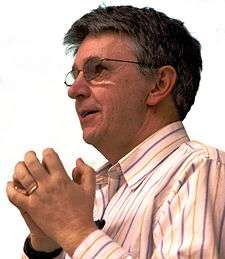László Lovász
| László Lovász | |
|---|---|
|
László Lovász speaking in 2007 at the EPFL | |
| Born |
March 9, 1948 Budapest, Hungarian Republic |
| Nationality | Hungarian, American |
| Fields | Mathematics, Computer Science |
| Institutions | Eötvös Loránd University, Yale University, Princeton University |
| Alma mater |
Eötvös Loránd University, Budapest Hungarian Academy of Sciences |
| Doctoral advisor | Tibor Gallai |
| Doctoral students |
András Frank Tamás Szőnyi Van Vu |
| Notable awards |
Kyoto Prize (2010) Hungary's Széchenyi Grand Prize (2008) Bolyai Prize (2007) John von Neumann Theory Prize (2006) Gödel Prize (2001) Knuth Prize (1999) Wolf Prize (1999) Fulkerson Prize (1982, 2012) Best Information Theory Paper Award (IEEE) (1981) Pólya Prize (SIAM) (1979) |
László Lovász (Hungarian pronunciation: [ˈlaːsloː ˈlovaːs]; born March 9, 1948) is a Hungarian mathematician, best known for his work in combinatorics, for which he was awarded the Wolf Prize and the Knuth Prize in 1999, and the Kyoto Prize in 2010. He is the current president of the Hungarian Academy of Sciences. He served as president of the International Mathematical Union between January 1, 2007 and December 31, 2010.[1]
Biography
Lovász was born on March 9, 1948 in the city of Budapest.[2] His father was a surgeon.[3] When Lovász was 14 he found a mathematical article written by Paul Erdős that fascinated him. One year later, he personally acquainted Erdős. They became friends and talked about mathematics and other subjects. This experience greatly inspired Lovász in searching for more knowledge.[4]
In high school, Lovász won gold medals at the International Mathematical Olympiad (in 1964, 1965, 1966 with two special prizes).[5]
Lovász received his Candidate of Sciences (C.Sc.) degree in 1970 at the Hungarian Academy of Sciences. His advisor was Tibor Gallai.
Until 1975, Lovász worked at Eötvös Loránd University, between 1975–1982, he led the Department of Geometry at the University of Szeged. In 1982, he returned to the Eötvös University, where he created the Department of Computer Science. The former and current scientists of the department include György Elekes, András Frank, József Beck, Éva Tardos, András Hajnal, Lajos Pósa, Miklós Simonovits, Tamás Szőnyi.
Lovász was a professor at Yale University during the 1990s and was a collaborative member of the Microsoft Research Center until 2006. He returned to Eötvös Loránd University, Budapest, where he was the director of the Mathematical Institute (2006–2011).
In 2014 he was elected the President of the Hungarian Academy of Sciences (MTA).[6]
Awards
Lovász was awarded the Brouwer Medal in 1993, the Wolf Prize in 1999, the Bolyai prize in 2007 and Hungary's Széchenyi Grand Prize (2008). He received the Advanced Grant of the European Research Council (2008). He was elected foreign member of the Royal Netherlands Academy of Arts and Sciences (2006)[7] and Royal Swedish Academy of Sciences (2007), honorary member[8] of the London Mathematical Society (2009). He received the Kyoto Prize for Basic Science (2010). In 2012 he became a fellow of the American Mathematical Society.[9] Lovász is listed as an ISI highly cited researcher.[10]
Books
He co-authored or edited the following books:
- Lovász L., Pelikán J., Vesztergombi K.: Kombinatorika, Tankönyvkiadó, Budapest, 1977
- Gács P., Lovász L.: Algoritmusok, Müszaki Könyvkiadó, Budapest, 1978; Tankönyvkiadó, Budapest, 1987
- L. Lovász: Combinatorial Problems and Exercises, Akadémiai Kiadó - North Holland, Budapest, 1979, revised: Elsevier, Akadémiai Kiadó, 1993, reprint: AMS Chelsea Publishing, 2007.
- L. Lovász, M.D. Plummer: Matching Theory, Akadémiai Kiadó - North Holland, Budapest, 1986
- L. Lovász: An Algorithmic Theory of Numbers, Graphs, and Convexity, CBMS-NSF Regional Conference Series in Applied Mathematics 50, SIAM, Philadelphia, Pennsylvania, 1986
- M. Grötschel, L. Lovász, A. Schrijver: Geometric Algorithms and Combinatorial Optimization, Springer, 1988
- B. Korte, L. Lovász, R. Schrader: Greedoids, Springer, 1991
- Ronald L. Graham, M. Grötschel, L. Lovász (eds.): Handbook of Combinatorics Elsevier Science B.V., 1995
- L. Lovász, J. Pelikán, K. Vesztergombi K.: Discrete Mathematics: Elementary and Beyond, Springer, New York, 2003
- L. Lovász: Large Networks and Graph Limits, American Mathematical Society, 2012
See also
- Topological combinatorics
- Lovász conjecture
- Erdős–Faber–Lovász conjecture
- Lovász local lemma
- Lenstra-Lenstra-Lovász lattice reduction algorithm
- Geometry of numbers
- Perfect graph theorem
- Greedoid
- Bell number
- Lovász number
- Graph limit
Notes
- ↑ The IMU Executive Committee 2007-2010
- ↑ Sooyoung Chang (2010) . Academic Genealogy of Mathematicians, Hungarian School: pp. 245-264. ISBN 978-981-4282-29-1.
- ↑ Educatio – "Interjú Lovász László matematikussal" (Biró Zsuzsanna Hanna) 2009/2 valóság pp. 219–240. (in Hungarian)
- ↑ O'Connor, John J.; Robertson, Edmund F., "László Lovász", MacTutor History of Mathematics archive, University of St Andrews.
- ↑ Laszlo Lovasz
- ↑ Magyar Tudományos Akadémia: "Lovász László a Magyar Tudományos Akadémia új elnöke", 2014/05/06 (in Hungarian)
- ↑ "L. Lovász". Royal Netherlands Academy of Arts and Sciences. Archived from the original on 8 February 2016. Retrieved 8 February 2016.
- ↑ LMS homepage
- ↑ List of Fellows of the American Mathematical Society, retrieved 2013-02-02.
- ↑ Thomson ISI, Lovász, László, ISI Highly Cited Researchers, retrieved 2010-02-02
External links
| Wikimedia Commons has media related to László Lovász. |
- Lovász's Homepage
- László Lovász at the Mathematics Genealogy Project
- "László Lovász's results". International Mathematical Olympiad.
| Cultural offices | ||
|---|---|---|
| Preceded by József Pálinkás |
President of the Hungarian Academy of Sciences 2014– |
Succeeded by Incumbent |
